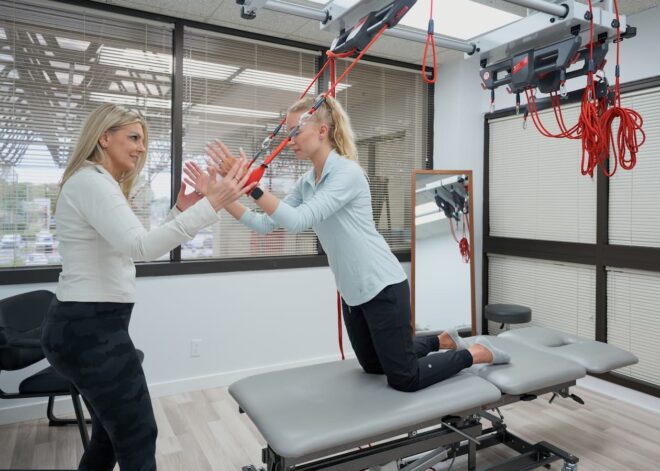The Pupper Club
Editorial Team
11 min read
In this installment of Meet the Merchant, we speak to Eileen Colavita of The Pupper Club in Downtown LA. Eileen shares how her passion for dogs and experience as a marketing guru helped her build a successful business catering to man’s best friend.
Our Meet the Merchant series features Q&As with real-world Clover merchants. Read our full catalog for innovative ideas and real-life stories of small businesses in action.
Clover: Tell us about The Pupper Club. Your website feels super elite and cool, with all of the dog furniture and your ball Jacuzzi pool.
Eileen Colavita: That’s a good way to describe it.
Clover: Let’s hear what the impetus was to start this place.
Colavita: Originally, the impetus for The Pupper Club came after more than 20 years as a PR and marketing person, working at agencies and owning my own. I had dogs personally that I would take to dog care facilities and did a couple of dog-centric events that brought me into the dog world. I understood what my options were in terms of hospitality and caring for dogs, and I wanted to find a place that suited my needs and wants in terms of dog care. The most important thing at the time was that I didn’t want to feel like my dog was being warehoused. I really wanted my dog in a smaller, more intimate setting, and I wanted that setting to be in my Downtown LA neighborhood, where I’d lived and worked for 30 years.
Clover: So you eventually opened up in Downtown LA. That’s a bold choice.
Colavita: Downtown really appealed to my business partner, Garry, and me. The area started to be more like New York and other downtown areas that are sectioned off into neighborhoods. If you’re in South Park, or in the Historic Core, or another part of downtown, you will choose to do your business in that neighborhood — meaning that’s where my coffee shop is, that’s where my nail salon is, and that’s where my dry cleaner is. In our thought process, that’s where my Pupper Club is. Specifically, we built The Pupper Club for a downtown type of community, most of whom have smaller dogs and want their dog in a more intimate setting.
Clover: So tell us more about the type of space you envisioned for The Pupper Club.
Colavita: I didn’t want a large, open-ended warehouse kind of feeling because that’s generally where I brought my dogs. Open spaces like that — even in dog parks — can be a little unsafe. When you have 60-70 dogs in a big room, it’s a lot of energy and a lot to handle. I don’t feel like they’re getting the care and attention that I want my dogs to get.
Obviously the setting has to be as entertaining, safe, and clean for the dogs as possible. They need to have fun, and they need to have enough space, but not too much space where they can get themselves into trouble. Also, ultimate cleanliness is a big thing for us at The Pupper Club as well as intimate socialization. Meaning two or three dogs in one area, a handful of dogs in another area, where we really match them up. And it becomes more of a play group experience than just putting the dogs in a room.
We consider The Pupper Club to be a playgroup experience, as opposed to just a place to leave your dog because you’re going to work. Rather than having to get into your car and drive out to the Warehouse District or somewhere like that to drop your dog off, we’re basically like your local coffee shop or wine bar. You come down, you bring your dog to The Pupper Club, and it’s very close by and walkable; it’s basically a neighborhood facility. That’s why we built it the way that we did.

Clover: What do you think uniquely prepared you for your official opening in September of 2018? Was it easy to find clientele, or did you just put up a sign and they showed up?
Colavita: No, gosh I wish it were that easy. I come from a marketing background, so really we began laying down the grassroots marketing long before we opened. We made sure our digital footprint was as tight as possible before we even opened. Understanding how SEO works — and it’s not just about putting up a website — but really about engaging with your community in the digital space, is something we were able to do on our own. We are lucky that we have that experience and were able to build on top of that. I transitioned from being a publicist working with restaurants and influencers in the foodie world, to working with those influencers’ dogs — creating narrative and a lot of content for The Pupper Club before we even opened.
Another really important element of the business that I think a lot of businesses could do is really engage with the community. There is not one building manager or concierge in downtown Los Angeles that we did not have a personal meeting with to let them know who we are, and how The Pupper Club can take care of their tenants’ dogs. By the time we opened, we had an opening special running with the majority of the apartment buildings around us.
Clover: That’s really cool. Given that you’re someone who worked in marketing and PR, then opened your own physical business, what advice do you have for other small business owners?
Colavita: Basically, you have to pull the trigger and just do it. You’re never going to find the perfect time — whether a pandemic is happening or not. The most important thing you want to make sure of is that you have enough of a cushion before you open, so that your business can have some time to get off the ground, and you don’t feel like you have to compromise anything.
Know that opening a retail store and having a physical space is incredibly expensive. You do want to make sure that you have a great team around you, getting you the best possible deals and negotiating. Fortunately, my business partner, Garry Reynolds, operates as our design/build lead, making the build out process so much more cost effective and streamlined. Then know that the marketing is on you. As a marketing person, I’m telling you that you have to be incredibly organized, efficient in your digital footprint, and you need to understand it more so than anyone in your company.
One thing I also learned as a business owner is it’s a good idea if you know how to do everything in your company so that it can run. Staff will quit, and unforeseen things will happen. You don’t want to have to depend on anyone else to run your store for you. Be able to do it yourself, and your business will never close. I became a groomer. I was moonlighting going to grooming school while I was still running my PR agency, just because I wanted to know how to do it. And honestly, it became an absolute necessity. There were times that I had to jump in. And now I love it.
Clover: Wow! You really considered all possible challenges to run your business. Did you have any curve balls thrown at you as you were setting up?
Colavita: Oh, yeah. I had no idea how expensive it was going to be to get even a 1,500 square foot space off the ground. Make sure that you have a great team around you that is protecting you when it comes to your lease and your finances. You need a great banker and a great accountant. We’ve worked with the same bank for a long time, and have a banker who knows us in Downtown LA.
Clover: You’ve mentioned a few times how important it is to have a great team. What about other resources? Obviously, Clover is a resource you use to help you manage your business. How did you find out about it?
Colavita: I learned about Clover from a dear friend of mine, Gina, who worked for First Data [Clover’s parent company prior to its merger with Fiserv]. She helps set up small businesses — whether it’s helping them find a bank, helping them set up an LLC or a corporation, or obtaining their business permits. Gina held our hand through all of those processes and also made sure we had the right equipment set up for our needs from an accounting perspective. She helped us get set up with Clover so that we had everything streamlined and connected for us before we even opened. It was very helpful.
Clover: That’s awesome. Talk to us about how you use Clover now.
Colavita: We have a Clover Mini that we use in store for the majority of our sales. We also store customer data in Clover. We have connected it to every possible resource, including Yelp, QuickBooks, and Nav to keep everything digitally in one place. The Clover Dashboard is really great for that. I use the Clover app to track my sales and reporting and things of that sort when I’m not in the store.
My favorite feature, especially right now, is Rapid Deposit. Because essentially, during the pandemic when business is up and down, some days are good, but some days we’ve had to completely close because of all the things that are going on. Having access to money, and being able to drop into my account immediately is huge. If we come in and have a customer buy a package for $1,200, I can dump that into my account and have access immediately rather than having to wait two days until it’s available. It’s an amazing feature.

Clover: What other effects has the pandemic had on your business? With people still at home, perhaps they’re just not as interested in doggy day care.
Colavita: That’s true. Day care has gone down by probably half. We changed our hours of operation because there’s no need for me to pay staff to be there 15 hours a day when our clients who are working from home, who continue to bring their dogs to us, are in their pajamas until 10:00 a.m. We’re as available as needed to our customers, and we’re still open seven days a week, but we’ve really transitioned our grooming business. Pre-pandemic it was more secondary, and now it’s become a huge asset to our customers and to the community downtown. We also offer pick-up and delivery now. We listened to our customers and heard what they needed, and transitioned ourselves accordingly.
Luckily we also, per the City of Los Angeles, did not have to close at any period during this pandemic. We were considered essential. We have a handful of pups we take care of for a few doctors and frontline workers. So we’re thrilled that we’re able to provide that service for people who need it. We’re happy that dogs are considered essential to the City of Los Angeles and the county. Even though our type of operation needed to change, we chose not to close, and to instead transition. Half of our income was decimated, but we made it back up by introducing new things — we changed our entire grooming menu.
Clover: That’s really cool that you were able to adapt. So what’s next for The Pupper Club?
Colavita: We’ve opened a second location in San Diego and just signed our third lease to open a second Downtown LA location in the Arts District. This new location will be primarily Grooming focused and a further expansion of our multi unit community concierge based offerings. We will offer one on one pet care as a tenant amenity, which is so important in communities with lots of dog owners. At this point the main model for all The Pupper Clubs is to be ground floor retail, city-center apartment buildings. Being a part of the apartment building community that we’re in, we serve as essentially a private facility for those residents. We found that during the pandemic, we have had to transition our business a little to become more of a concierge service for people, and give them what they need while they’re at home. While we’re transitioning out of a day care facility into an overall concierge facility, we’re getting to know what our customers really need from us. That’s Pupper Club in a nutshell.
Read more of our Meet the Merchant stories for real-life stories of small businesses in action all over the country. Want to be featured in this series? Fill out our questionnaire, and if we can include you in a future interview cycle, we’ll send you an invitation!
Related Posts
Actify Physiotherapy and Wellness
Get to know the Clover Mini: A powerful POS system for retailers
Popular Topics
Stay in touch
Sign up and learn more about Clover.
Thank you for your subscription!
More posts about starting a small business
eBook
Retail roadmap: Financial goal-setting for the year ahead
Please share your contact information
to access our premium content.
Thank you for sharing your contact information.
Download Now





